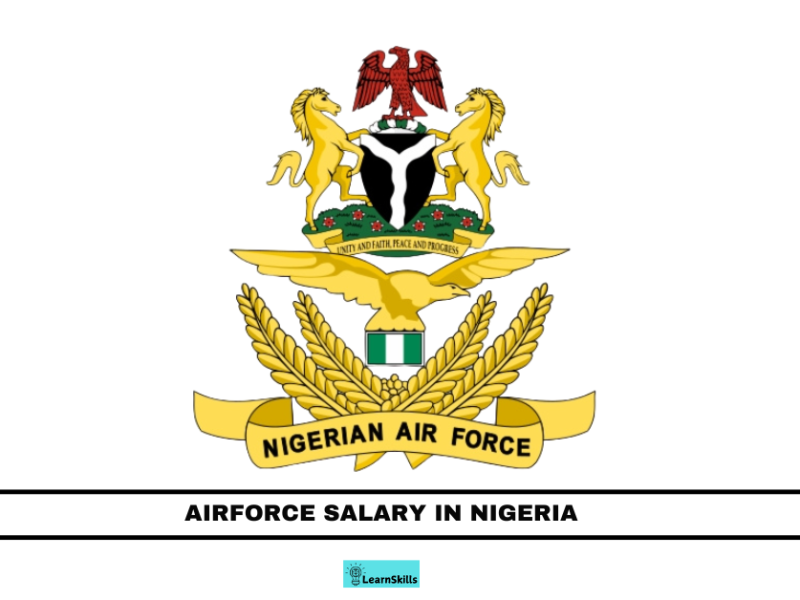The Nigerian Air Force (NAF) plays a key role in maintaining national security and is vital in the country’s military. If you are considering a career in the NAF or are simply curious about what Air Force personnel earn, it’s important to understand the salary structure.
The average monthly salary for an Air Force officer in Nigeria is around ₦100,000. Different ranks can earn varying amounts depending on their experience and position.
In the NAF, salaries differ based on rank and position. A Trainee might earn about ₦10,237 monthly, while ranks like Flying Officer can earn ₦218,400. Knowing these figures can help you gauge the financial benefits of joining the military and the potential for career growth.
Overview of the Nigerian Air Force
The Nigerian Air Force (NAF) plays a crucial role in Nigeria’s defense. It has a rich history and a significant place within the country’s military structure.
History and Role of the NAF
The Nigerian Air Force was established in 1964, following the need for air support in military operations. Initially, it began with a small fleet and limited personnel. Over the years, the NAF has expanded its capabilities and modernized its equipment.
The NAF’s roles include defending Nigeria’s airspace, conducting aerial operations, and providing support during national emergencies. It is also involved in peacekeeping missions locally and internationally.
NAF’s Place within the Nigerian Armed Forces
The Nigerian Air Force is one of the three main branches of the Nigerian Armed Forces, alongside the Army and the Navy. Each branch has unique roles that work together to ensure the nation’s security.
The NAF focuses on air superiority and tactical support for ground operations within this structure. The NAF collaborates closely with the Army and Navy for joint operations, and the teamwork helps strengthen Nigeria’s overall defense strategy.
The NAF’s role is vital in responding to threats such as insurgencies, terrorism, and other security challenges facing the nation.
Ranks and Structure of the NAF
The Nigerian Air Force (NAF) has a clear hierarchy of ranks and roles. Understanding this structure can help you grasp the force organization and the responsibilities of each rank.
Commissioned Officers
Commissioned Officers hold leadership positions and are responsible for overseeing operations. They are trained in various fields and have significant duties.
Key ranks include:
- Pilot Officer: The entry rank, earning approximately ₦187,159 monthly.
- Flying Officer: This rank receives around ₦218,400 a month.
- Flight Lieutenant: The Monthly salary is about ₦232,484.
- Squadron Leader: Earns around ₦248,004 monthly.
- Wing Commander: Has more responsibilities and earns more than the Squadron Leader.
- Air Commodore: A senior rank with significant oversight duties.
- Air Chief Marshal: The highest rank, receiving a monthly salary of ₦1,724,283.
Non-Commissioned Officers
Non-commissioned officers (NCOs) play essential roles in operations and training. They often bridge the gap between commissioned officers and enlisted personnel.
Important ranks in this category include:
- Air Warrant Officer: Earns around ₦171,793 monthly.
- Master Warrant Officer: With a monthly salary of about ₦165,697.
- Flight Sergeant: Responsible for managing junior airmen and airwomen.
- Sergeant: Assists in training and leadership responsibilities within the squadron.
NCOs are vital for maintaining discipline and executing orders from higher ranks.
Airmen and Airwomen
Airmen and Airwomen make up the backbone of the NAF. They perform critical tasks that keep operations running smoothly.
Their ranks include:
- Aircraftman: The entry-level position for enlisted personnel.
- Corporal: Often serves as a junior leader for a small team.
- Sergeant: Takes on more responsibilities and leads airmen in daily tasks.
Airmen and Airwomen are crucial for technical and support roles in the NAF. Their contributions ensure the efficiency and effectiveness of the Air Force’s operations.
Recruitment and Training
The recruitment and training process in the Nigerian Air Force is structured to ensure that candidates are well-prepared for their roles. This includes a detailed enlistment procedure and specific training regimens for various ranks.
Enlistment Process
You must undergo a specific application process to join the Nigerian Air Force. First, you must meet the basic requirements, such as age, educational qualifications, and nationality. Typically, recruits should have at least a secondary school certificate.
The application can be completed online through the Nigerian Air Force recruitment portal. Successful candidates are then invited for written examinations and interviews.
If you pass these stages, you undergo a medical examination to ensure you meet health standards. Once cleared, recruits are officially enlisted. You could enter as a commissioned or a non-commissioned officer, depending on the position.
Training Regimens
After enlistment, recruits undergo rigorous training, which varies based on your rank and position within the force.
Recruits typically begin with basic military training, learning essential skills such as discipline, teamwork, and physical fitness. For basic airmen, training lasts several months and covers weapons handling, navigation, and communication skills.
Commissioned officers receive additional training that might include leadership courses and specialized aviation skills. Both training paths emphasize physical and mental conditioning.
Upon completion, trainees are assigned to different units for ongoing training relevant to their duties. This ensures you remain prepared for active duty assignments in various branches of the Air Force.
Salary Structure and Benefits
The salary structure in the Nigerian Air Force is defined by ranks, with each rank receiving a different monthly salary. Benefits and allowances also contribute to the overall compensation package for personnel.
Monthly Salary and Rankings
In the Nigerian Air Force, each rank has a specific salary. Here are some monthly salaries for various ranks:
- Lance Corporal: N10,000 – N15,000
- Corporal: N16,000 – N20,000
- Sergeant: N20,000 – N30,000
- Warrant Officer: N40,000 – N60,000
- Master Warrant Officer: N70,000 – N90,000
- Pilot Officer: N187,159
- Flying Officer: N218,400
- Flight Lieutenant: N232,484
- Squadron Leader: N248,004
- Group Captain: ₦352,631
- Air Vice-Marshal: ₦1,376,343
- Air Marshal: ₦1,486,451
Salaries increase with rank and experience, reflecting your responsibilities and leadership within the Air Force.
Additional Benefits and Allowances
In addition to the base salary, Nigerian Air Force personnel receive various benefits. These may include housing allowances, medical care, and educational support for dependents.
You also may have access to travel allowances when on duty. Other benefits can include retirement plans and opportunities for training or advancement.
The combination of salary and benefits provides a competitive compensation package that supports the well-being of personnel and their families.
Life in the NAF
Life in the Nigerian Air Force (NAF) offers unique experiences for active duty soldiers and officers. It includes professional growth opportunities and varied living conditions that reflect the military lifestyle.
Career Advancement Opportunities
In the NAF, career advancement is supported through several pathways. As a soldier, you start in a rank based on your qualifications.
Non-Commissioned Officers (NCOs) and Commissioned Officers can advance by completing necessary training and demonstrating leadership skills.
Promotion criteria often include performance evaluations, years of service, and additional training. The NAF provides various professional development programs. These programs help you gain skills in aviation, engineering, and logistics.
By participating, you enhance your expertise and increase your chances for promotion.
Living Conditions and Deployments
Living conditions in the NAF can vary. Base housing is typically provided for active-duty personnel. For many, these accommodations are comfortable but basic.
Some soldiers may experience deployments. Deployments can lead to temporary changes in living conditions. During deployments, you might be stationed at different locations. These can range from base camps to operational areas.
You can usually find amenities like healthcare and recreational facilities at significant bases. You may also receive benefits such as health insurance and paid leave. These contribute to a balanced lifestyle while serving your country.










